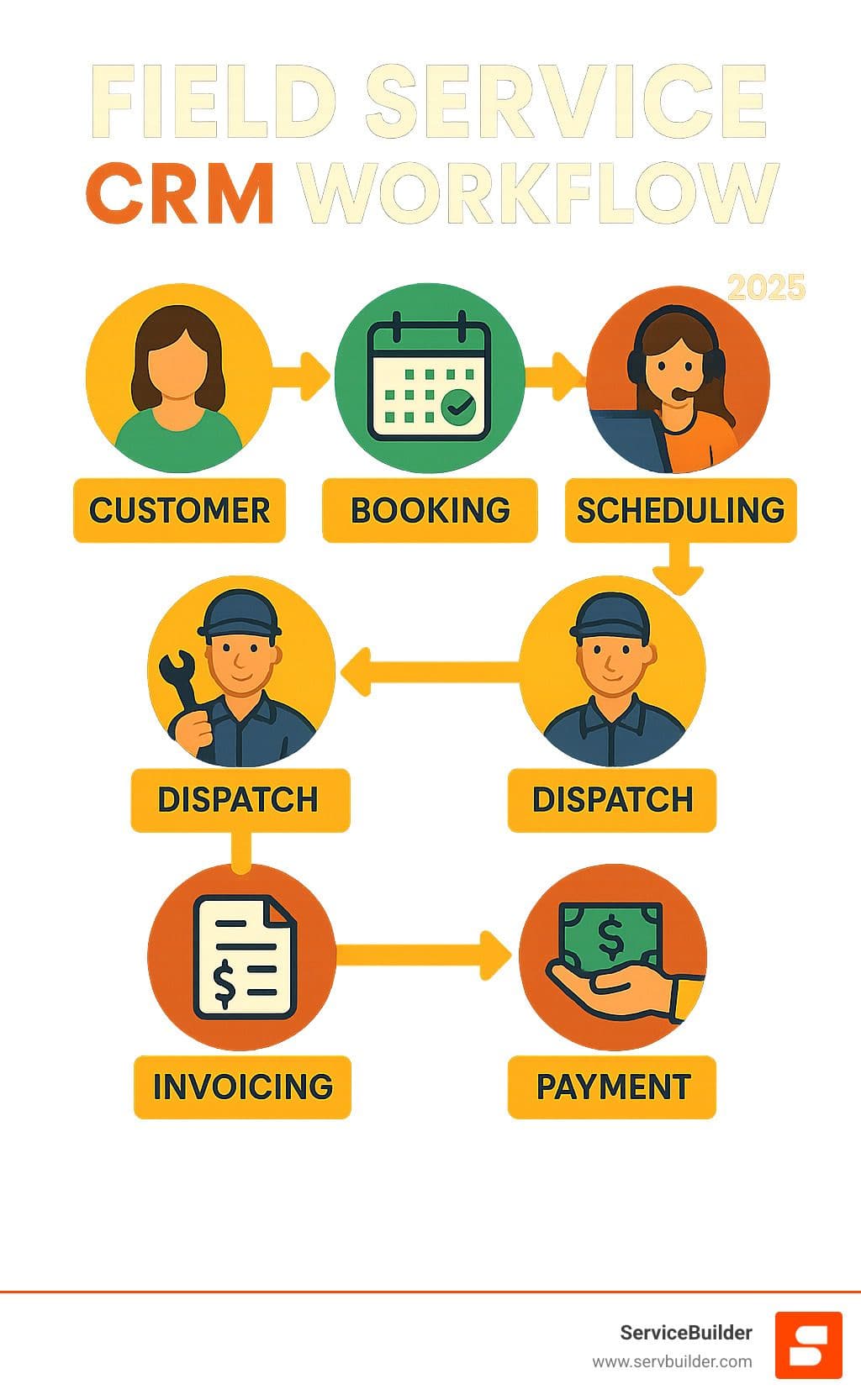Field Service CRM System Roundup: Organize Your Business Like a Pro
- Andrew Leger
Why Every Field Service Business Needs a CRM System¶
A field service CRM system is specialized software that helps service businesses manage customer relationships, schedule technicians, track jobs, and handle billing from one platform. Unlike generic CRMs for sales teams, these systems are designed for companies that dispatch workers to customer locations.
Top Field Service CRM Systems for 2024:
Platform
Best For
Key Strengths
Starting Price
Jobber
Home service SMBs
Scheduling, invoicing
$29/month
Housecall Pro
Growing trades businesses
Marketing automation, community
$61/month
Salesforce Field Service
Enterprise organizations
AI-powered features, scalability
$165/month
ServiceBuilder
Modern SMBs
AI scheduling, mobile-first
Custom pricing
FieldPulse
Small contractors
Quick implementation
$39/month
The results are clear: Salesforce Field Service users report a 31% increase in first-time-fix rates, and FieldPulse customers grow 78% year-over-year on average. Many businesses still rely on whiteboards and spreadsheets, leading to missed appointments and lost revenue. As one plumbing customer noted, organization was "the hardest part" before switching to field service software, which "cut my day down heaps."
The right field service CRM eliminates these pain points by connecting your office, field teams, and customers in real-time, changing chaos into streamlined operations for any service business.
I'm Andrew Leger, and I've spent over 15 years building enterprise software before creating ServiceBuilder. After seeing countless SMBs struggle with outdated tools, I developed a modern field service CRM system that combines AI-assisted scheduling, a mobile-first design, and real-time visibility for today's field teams.

The Game-Changing Benefits of a Field Service CRM¶
Running a field service business without the right tools means juggling schedules on whiteboards and tracking customers in spreadsheets. A field service CRM system acts as your business's central nervous system, connecting every moving part into one smooth operation. The results are impressive and backed by data.
Increased Productivity and Efficiency: Salesforce Field Service users report a 32% increase in mobile worker productivity, meaning technicians spend less time on paperwork and more time on jobs. Similarly, FieldPulse customers grow an average of 78% year over year with 50% fewer missed appointments.
Improved Customer Satisfaction: A streamlined operation leads to happier customers. Service Fusion maintains a 95.7% customer satisfaction score, while Salesforce users see a 31% increase in first-time-fix rates. This comes from having complete customer histories, automated follow-ups, and proactive communication.
Significant Cost Savings: The financial impact is clear. A 26% decrease in truck rolls for Salesforce users means real savings on fuel and vehicle wear. Microsoft Dynamics 365 Field Service delivers a 346% return on investment with payback in less than 6 months.
Better Data Management: Instead of hunting through filing cabinets, a field service CRM system provides a centralized hub for customer histories, job notes, photos, and invoices.
Any business that sends technicians into the field can benefit, including HVAC, plumbing, electrical, landscaping, cleaning, and pest control services. As Gartner research shows, improved customer satisfaction directly leads to greater loyalty and sustainable growth.
While enterprise platforms like Salesforce offer powerful AI features and established players like Jobber and Housecall Pro serve hundreds of thousands of professionals, a modern field service CRM system like ServiceBuilder is built specifically for U.S.-based SMBs. It delivers a mobile-first experience without the complexity or bloated pricing of legacy systems.
Must-Have Features of a Modern Field Service CRM System¶
A great field service business relies on the right features working together. While basic contact management is a start, growing businesses need comprehensive functionality to handle everything from common FSM scheduling and dispatch mistakes to complex invoicing. An effective field service CRM system needs core capabilities like scheduling, work order management, a customer database, mobile access, invoicing, and reporting.
Centralized Customer & Job Management¶
Your CRM becomes the memory bank of your business, storing every important detail.

Modern systems like Jobber and ServiceBuilder offer detailed customer profiles with service history, equipment details, and property specifics. This complete timeline of every interaction ensures technicians are always prepared. Key features include searchable contact management, detailed job notes with photos, and centralized document storage for contracts and permits. FieldPulse offers this functionality with an intuitive interface, while Housecall Pro consolidates everything into a single customer dashboard with additional marketing automation features.
Intelligent Scheduling and Dispatching¶
Modern CRMs bring intelligence to dispatch operations, replacing whiteboards and frantic phone calls.
Automated Scheduling: AI-powered systems like Salesforce Field Service and Microsoft Dynamics 365 optimize schedules based on technician availability, skills, and location, while ServiceBuilder offers similar AI capabilities designed specifically for SMBs.
Drag-and-Drop Calendar: Platforms like Smart Service 365 and FieldPulse offer intuitive calendars for easy job reassignment, competing directly with Jobber's scheduling interface.
Real-time GPS Tracking & Route Optimization: See where your technicians are with GPS tracking from providers like Service Fusion and Housecall Pro, and generate efficient routes to save on fuel and time.
Technician Status Updates: Field teams can update job status from their mobile devices, keeping the office informed without constant check-ins. Workiz and FieldPulse both offer visual work management views for this functionality.
Mobile App for Field Technicians¶
A powerful mobile app transforms a technician's smartphone into a complete business tool.
Offline Access: Crucial for areas with poor connectivity, apps from Salesforce and FieldPulse allow technicians to work offline and sync data later, while ServiceBuilder offers native mobile-first design for superior performance.
Digital Signatures: Speed up approvals and reduce paperwork. Housecall Pro, Jobber, and Workiz all offer this feature with varying levels of customization.
On-site Quoting & Media Attachments: Generate quotes on the spot and attach photos or videos to document job sites, providing essential visual context. FieldPulse and ServiceBuilder both excel in this area.
Real-time Updates: Technicians can update job status, add notes, and complete forms from their Android or iOS devices across all major platforms including Jobber, Housecall Pro, and ServiceBuilder.
Streamlined Quoting, Invoicing, and Payments¶
A healthy cash flow depends on fast, efficient billing. A modern field service CRM system streamlines this entire process.
Customizable Templates & Online Payments: Create professional estimates and invoices. FieldPulse offers good-better-best pricing options, while Housecall Pro and Jobber integrate with Stripe or PayPal for convenient online payments.
Automated Follow-ups & QuickBooks Integration: Automatically remind customers of overdue invoices and seamlessly sync financial data with accounting software. Jobber, Housecall Pro, and FieldPulse all offer integrations with QuickBooks or Xero, while ServiceBuilder provides seamless accounting integration designed for trades businesses.
In-field Payment Processing: Accept credit card payments on-site. Workiz and Smart Service 365 provide this functionality, often with next-day funding to improve cash flow, competing with similar features from Housecall Pro and Jobber. Some systems can even automate the entire invoicing process.
2024 Roundup: Comparing Top Field Service CRM Solutions¶
Choosing the right field service CRM system in 2024 means navigating a market with options for every budget and need. Solutions range from simple scheduling tools to comprehensive AI-powered platforms. Today's leading platforms focus on specific niches, from residential trades to large enterprises, with varied pricing models to match.

Head-to-Head: A Field Service CRM System Comparison¶
Here's how leading platforms stack up across key features:
Platform
AI Scheduling
Mobile Experience
Target Market
Pricing Model
Best For
Jobber
Basic
Strong, intuitive
Home service SMBs
Tiered (per user/features)
Streamlined scheduling & invoicing for growing home service businesses.
Housecall Pro
Basic
User-friendly
Growing trades businesses
Tiered (features)
Trades businesses seeking marketing automation & community support to scale.
Salesforce Field Service
Advanced
Robust, offline
Enterprise organizations
Per user (complex tiers)
Large companies needing highly customizable, AI-driven, and scalable solutions.
Microsoft Dynamics 365 Field Service
Advanced
Integrated
Enterprises, Microsoft Ecosystem
Per user (tiered)
Businesses deeply integrated with Microsoft products, seeking high ROI.
ServiceBuilder
Advanced
Native, mobile-first
U.S. SMBs (HVAC, Plumbing, etc.)
Custom (value-based)
Modern SMBs prioritizing AI-assisted scheduling, speed, and intuitive design without bloat.
In-Depth Look at Leading Platforms¶
Jobber: Trusted by over 200,000 professionals, Jobber is a reliable workhorse for home service businesses, known for its intuitive interface and strong scheduling and invoicing features.
Housecall Pro: This platform focuses on growth tools, offering automated marketing and a strong community to help trades businesses scale and build their reputation.
Salesforce Field Service: An enterprise-grade, AI-driven platform for large organizations with complex needs. It leverages Salesforce's powerful CRM foundation to deliver a 31% increase in first-time-fix rates.
Microsoft Dynamics 365 Field Service: Offers deep integration with the Microsoft ecosystem, creating seamless workflows for companies already invested in Microsoft products and delivering a 346% ROI.
ServiceBuilder: A modern, mobile-first platform for U.S.-based SMBs in trades like HVAC and plumbing. It delivers AI-assisted scheduling and quoting without the feature bloat of legacy systems, emphasizing speed and intuitive design.
Other noteworthy players include FieldPulse, known for rapid implementation; Workiz, with its built-in phone system; and Service Fusion, a comprehensive solution with GPS fleet tracking. The best choice depends on your business size, industry, and budget.
How to Select the Perfect Field Service CRM for Your Business¶
Choosing the right field service CRM system is about finding software that solves your specific problems. The flashiest option isn't always the best; focus on what truly matters for your business.
Key Factors to Consider Before You Buy¶
Business Needs & Pain Points: Start by listing your biggest headaches, whether it's scheduling chaos or lost invoices. These are your must-have features.
Scalability: Ensure the software can grow with you. Platforms like Jobber scale well for SMBs, Salesforce handles enterprise complexity, and ServiceBuilder helps SMBs scale efficiently.
Ease of Use: If the software is confusing, your team won't use it. Platforms like Housecall Pro and FieldPulse pride themselves on quick adoption.
Customer Support: When issues arise, you need fast, reliable help. ServiceBuilder focuses on personalized support for SMBs who can't afford downtime.
Integration Capabilities: The system should connect with tools you already use, like QuickBooks. Most leading platforms offer integrations.
Total Cost of Ownership (TCO): Look beyond the monthly fee. Consider implementation, training, and support costs. FieldPulse can be implemented in just 3 weeks, saving on productivity loss.
Data Security: Protecting customer data is critical. Look for vendors who take security risks seriously, with features like encryption and privacy-first architecture.
Vendor Reputation: Choose a vendor with a track record of innovation and customer satisfaction, reflected in metrics like Service Fusion's 95.7% CSAT score.
Understanding Pricing Models¶
Field service CRM system pricing typically falls into a few categories: per-user-per-month, tiered plans (like those from Jobber and Housecall Pro), and freemium models (offered by platforms like FieldCo). Always ask about hidden costs like setup or training fees. Custom quotes from vendors like ServiceBuilder or Salesforce can offer better value for specific needs.
The Future is Here: Emerging Trends in Field Service CRM Technology¶

The technology is evolving rapidly, moving from science fiction to standard features.
Artificial Intelligence: AI is more than a buzzword; it delivers real value. AI in Field Service: Real vs. Buzzwords explains how platforms like Salesforce, Workiz, and ServiceBuilder use AI for smart scheduling, communication, and quoting.
IoT Integration: The Internet of Things (IoT) enables predictive maintenance. Systems like Microsoft Dynamics 365 Field Service connect to equipment sensors to schedule service before a breakdown occurs.
Proactive Service: According to Gartner research, proactive service transforms the customer experience. Smart CRMs can alert you to potential issues before customers even notice.
Data Analytics: Modern CRMs turn operational data into actionable insights, helping you identify profitable services and efficient technicians.
Adopting these trends gives you a significant competitive advantage.
Frequently Asked Questions about Field Service CRM Systems¶
Here are answers to common questions from service business owners considering a field service CRM system.
What's the difference between a standard CRM and a field service CRM?¶
A standard CRM (like Salesforce Sales Cloud or HubSpot) is built for sales teams to track leads and manage pipelines. A field service CRM system is purpose-built for the operational needs of businesses that dispatch technicians. It focuses on features like scheduling, dispatching, mobile apps for field use, and work order management. In short, a standard CRM asks, "How do I sell to this customer?" while a field service CRM asks, "How do I get the right tech to the right job at the right time?"
How long does it take to implement a field service CRM system?¶
Implementation time varies by complexity. A small business moving from spreadsheets might be operational in a few weeks; FieldPulse, for example, can take about 3 weeks. Mid-sized operations may need 1 to 3 months for data migration and training. Large enterprises using platforms like Salesforce Field Service or Microsoft Dynamics 365 should plan for several months due to extensive customization and training requirements. The timeline depends on data migration, customization, and team training.
Can a field service CRM integrate with my accounting software?¶
Yes, and it's a critical feature. Most leading field service CRM system platforms integrate with popular accounting software like QuickBooks Online, QuickBooks Desktop, and Xero. This integration automates the flow of invoices, customer information, and payment records between systems, eliminating double-entry and providing real-time financial visibility. Platforms like Jobber, Housecall Pro, and ServiceBuilder offer seamless integrations to streamline your financial workflows.
Conclusion¶
Choosing the right field service CRM system is a transformative decision for your business. These specialized platforms replace chaotic spreadsheets with streamlined workflows, improve customer satisfaction, and boost your bottom line. The data is clear: from Salesforce's 31% better first-time-fix rates to FieldPulse's 78% year-over-year customer growth, the right CRM delivers measurable results.
The market offers a solution for every need. Jobber and Housecall Pro serve SMBs with intuitive tools, while Salesforce and Microsoft provide powerful enterprise-grade platforms. At ServiceBuilder, we've built our field service CRM system for U.S.-based SMBs in trades like HVAC and plumbing who need modern, mobile-first technology without complexity. Our AI-assisted scheduling and privacy-first architecture help operators scale faster and work smarter.
The future of field service—driven by AI, IoT, and advanced analytics—is already here. Making the right choice requires evaluating your specific needs, budget, and growth plans. Whether you're just starting or ready to modernize, there is a field service CRM system to help you succeed.
Ready to see how a smarter future for field service teams can transform your business?
Why We're Building Service Builder: A Smarter Future for Field Service Teams
Explore the future of field service management